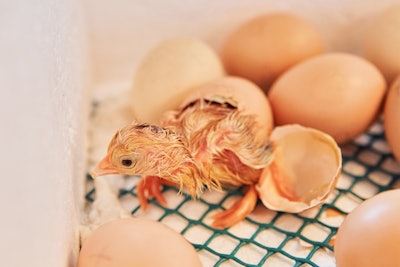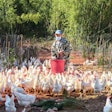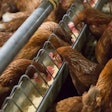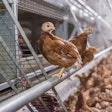
The finalists of the Egg-Tech Prize, a US$6 million research competition focused on in-ovo chick sexing, were announced on December 12th, 2023.
Three finalists have earned a portion of the money to advance their research over the next 12 months. Then, the Egg-Tech Committee will evaluate their progress to determine the winner, who will receive the remainder of the US$6million.
“This Prize is on the cusp of profoundly revolutionizing global egg production,” stated Dr. Jasmine Bruno, research organization Foundation for Food & Agriculture Research (FFAR) Scientific Program Director of Advanced Animal Systems. “The success of one of these technologies will boost profitability, improve animal welfare and increase the sustainability of our egg supply chains.”
Lewis Bollard, charitable funder Open Philanthropy's Program Officer for Farm Animal Welfare, said, “We’re already seeing the adoption of in-ovo sexing technology in Europe, and I’m optimistic that these finalists’ innovations will enable the U.S. egg industry to soon follow suit.”
The three finalists and their research
Leonard van Bommel, Dutch company In Ovo Systems Engineer, received US$495,990 to continue developing and scaling an in-ovo sexing technology. The technology measures a naturally occurring biomarker in the embryo’s allantoic fluid, which allows the producer to differentiate between sexes. The system sorts the eggs by sex on the ninth day of development before hatch. The funds allow In Ovo to increase the technology’s accuracy, capacity and ability to sort eggs earlier.
Dr. Carla van der Pol, hatchery equipment company HatchTech Group Research Manager, earned US$499,331 to use hyperspectral imaging and spectroscopy to develop an optical method for sexing eggs. Van der Pol’s team is using its existing fluid uptake machinery to extract droplets of the embryos’ allantoic fluid. The project involves spectral technologies that will be developed to analyze the fluid on the eighth day of incubation. The light’s wavelength patterns reveal the sex.
Thomas Turpen, technology company SensIT Ventures, Inc. Founder and Chief Executive Officer, won US$494,956 to continue research on a microchip-based chemical sensor that can measure volatile organic compounds (VOCs) released from hatching eggs. Machine learning uses the VOCs to identify eggs by sex. The funding is supporting the integration of the microchip sensors with a custom automated egg handling machine that sorts the sexed eggs, as well as testing at commercial hatcheries.
More about the competition
The competition, hosted by FFAR and Open Philanthropy is in its final phase, which is referred to as Phase II.
The contest is a result of animal welfare organization pressure on the egg industry to find an alternative approach to culling day-old male layer chicks. Additionally, producers use time and resources to incubate male eggs, then cull them.
Technology that could determine a chick’s sex before hatching, and be scaled to a commercial level, could help the egg industry eliminate male chick culling, save money and divert unhatched eggs to alternate uses.


















